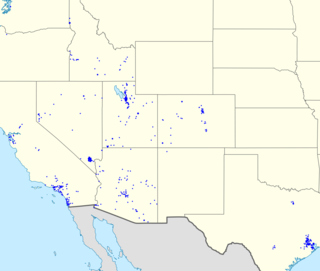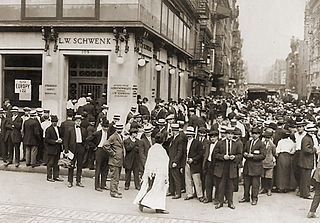
The Federal Deposit Insurance Corporation (FDIC) is a United States government corporation supplying deposit insurance to depositors in American commercial banks and savings banks. The FDIC was created by the Banking Act of 1933, enacted during the Great Depression to restore trust in the American banking system. More than one-third of banks failed in the years before the FDIC's creation, and bank runs were common. The insurance limit was initially US$2,500 per ownership category, and this has been increased several times over the years. Since the enactment of the Dodd–Frank Wall Street Reform and Consumer Protection Act in 2010, the FDIC insures deposits in member banks up to $250,000 per ownership category. FDIC insurance is backed by the full faith and credit of the government of the United States, and according to the FDIC, "since its start in 1933 no depositor has ever lost a penny of FDIC-insured funds".

In the United States, banking had begun by the 1780s, along with the country's founding. It has developed into a highly influential and complex system of banking and financial services. Anchored by New York City and Wall Street, it is centered on various financial services, such as private banking, asset management, and deposit security.

The savings and loan crisis of the 1980s and 1990s was the failure of 32% of savings and loan associations (S&Ls) in the United States from 1986 to 1995. An S&L or "thrift" is a financial institution that accepts savings deposits and makes mortgage, car and other personal loans to individual members.
Deposit insurance or deposit protection is a measure implemented in many countries to protect bank depositors, in full or in part, from losses caused by a bank's inability to pay its debts when due. Deposit insurance systems are one component of a financial system safety net that promotes financial stability.
The Continental Illinois National Bank and Trust Company was at one time the seventh-largest commercial bank in the United States as measured by deposits, with approximately $40 billion in assets. In 1984, Continental Illinois became the largest ever bank failure in U.S. history, when a run on the bank led to its seizure by the Federal Deposit Insurance Corporation (FDIC). Continental Illinois retained this dubious distinction until the failure of Washington Mutual in 2008 during the financial crisis of 2008, which ended up being over seven times larger than the failure of Continental Illinois.

The Financial Institutions Reform, Recovery, and Enforcement Act of 1989 (FIRREA), is a United States federal law enacted in the wake of the savings and loan crisis of the 1980s.
Beal Bank is an American bank, which was founded by Texas-based entrepreneur D. Andrew "Andy" Beal. It includes two separately chartered banks, Beal Bank and Beal Bank USA. Each entity is insured by the Federal Deposit Insurance Corporation (FDIC).
IndyMac, a contraction of Independent National Mortgage Corporation, was an American bank based in California that failed in 2008 and was seized by the United States Federal Deposit Insurance Corporation (FDIC).

Zions Bancorporation is a national bank headquartered in Salt Lake City, Utah. It operates as a national bank rather than as a bank holding company and does business under the following seven brands: Zions Bank, Amegy Bank of Texas, California Bank and Trust, National Bank of Arizona, Nevada State Bank, Vectra Bank Colorado, and the Commerce Bank of Washington. It has 416 branches and over 1 million customers. It was founded by the Church of Jesus Christ of Latter-day Saints in 1873, although the church divested its interest in the bank in 1960.
Corus Bankshares, Inc. operated as the holding company for Corus Bank, N.A., a United States company that offered consumer and corporate banking products and services.

A bank failure occurs when a bank is unable to meet its obligations to its depositors or other creditors because it has become insolvent or too illiquid to meet its liabilities. A bank usually fails economically when the market value of its assets declines to a value that is less than the market value of its liabilities. The insolvent bank either borrows from other solvent banks or sells its assets at a lower price than its market value to generate liquid money to pay its depositors on demand. The inability of the solvent banks to lend liquid money to the insolvent bank creates a bank panic among the depositors as more depositors try to take out cash deposits from the bank. As such, the bank is unable to fulfill the demands of all of its depositors on time. A bank may be taken over by the regulating government agency if its shareholders' equity are below the regulatory minimum.
Nevada State Bank, a division of Zions Bancorporation, N.A. Member FDIC, is a full-service bank with branches statewide. Founded in 1959, Nevada State Bank serves 20 communities across the state of Nevada. Zions Bancorporation, N.A. operates in nearly 500 local financial centers across 11 Western states: Arizona, California, Colorado, Idaho, Nevada, New Mexico, Oregon, Texas, Utah, Washington and Wyoming. Zions Bancorporation, N.A. is included in the S&P 400 Mid-Cap and NASDAQ Financial 100 indices.
A bridge bank is an institution created by a national regulator or central bank to operate a failed bank until a buyer can be found.
California Bank & Trust (CB&T) is a full-service bank specializing in consumer, commercial and wealth management services headquartered in San Diego, California. With more than 80 branches located throughout California, CB&T is a subsidiary of Zions Bancorporation, one of the nation's top 50 bank holding companies, with assets of approximately $91 billion.

Amboy Bank is an American bank headquartered in Old Bridge, New Jersey. Amboy Bank has locations in Middlesex and Monmouth Counties in central New Jersey, and serves consumer and commercial customers. Its deposits are insured to the legal maximum by the Federal Deposit Insurance Corporation (FDIC).

Western Alliance Bancorporation is a regional bank holding company headquartered in Phoenix. It is on the list of largest banks in the United States and is ranked 42nd on the Forbes list of America's Best Banks.
A deposit insurance national bank is a temporary bank in the United States that is established by the Federal Deposit Insurance Corporation (FDIC) in the wake of a bank failure under the Banking Acts of 1933 and 1935.








